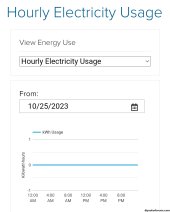Landlord/homeowner wants to be Off-Grid.
So...I wonder...
Why are there more people not hooking up the "240"'s to solar? Is it the startup surge !,eating up available solar ?
Every morn,there's plenty of batt % left over and I'm in san diego,lots of sunshine,so... I'm thinking,(oh-oh),why not hookup W/D,HVAC,n stove/oven,(I know ! ),landlord-roomy-homeowner likes it though ! Except for start up surge and being carefully only 1 at a time ! I'm not seeing any trouble ?
What say you ?
So...I wonder...
Why are there more people not hooking up the "240"'s to solar? Is it the startup surge !,eating up available solar ?
Every morn,there's plenty of batt % left over and I'm in san diego,lots of sunshine,so... I'm thinking,(oh-oh),why not hookup W/D,HVAC,n stove/oven,(I know ! ),landlord-roomy-homeowner likes it though ! Except for start up surge and being carefully only 1 at a time ! I'm not seeing any trouble ?
What say you ?




